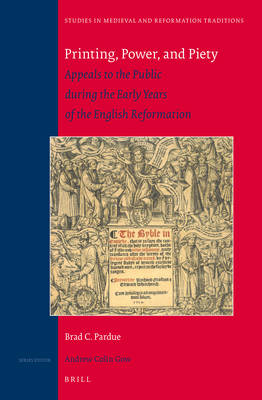
- Afhalen na 1 uur in een winkel met voorraad
- Gratis thuislevering in België vanaf € 30
- Ruim aanbod met 7 miljoen producten
- Afhalen na 1 uur in een winkel met voorraad
- Gratis thuislevering in België vanaf € 30
- Ruim aanbod met 7 miljoen producten
Zoeken
Printing, Power, and Piety
Appeals to the Public During the Early Years of the English Reformation
Brad C Pardue
€ 128,62
+ 257 punten
Omschrijving
This project examines the important implications of printed vernacular appeals to a nascent public by the reformer William Tyndale, by religious conservatives such as Thomas More, and by Henry VIII's regime in the volatile early years of the English Reformation. The book explores the nature of this public (materially and as a discursive concept) and the various ways in which Tyndale provoked and justified public discussion of the central religious issues of his day. Tyndale's writings raised important issues of authority and legitimacy and challenged many of the traditional notions of hierarchy at the heart of early modern European society. This study analyzes how this challenge manifested itself in Tyndale's ecclesiology and his political theology.
Specificaties
Betrokkenen
- Auteur(s):
- Uitgeverij:
Inhoud
- Aantal bladzijden:
- 248
- Taal:
- Engels
- Reeks:
- Reeksnummer:
- nr. 162
Eigenschappen
- Productcode (EAN):
- 9789004232051
- Verschijningsdatum:
- 27/08/2012
- Uitvoering:
- Hardcover
- Formaat:
- Genaaid
- Afmetingen:
- 163 mm x 241 mm
- Gewicht:
- 521 g

Alleen bij Standaard Boekhandel
+ 257 punten op je klantenkaart van Standaard Boekhandel
Beoordelingen
We publiceren alleen reviews die voldoen aan de voorwaarden voor reviews. Bekijk onze voorwaarden voor reviews.











